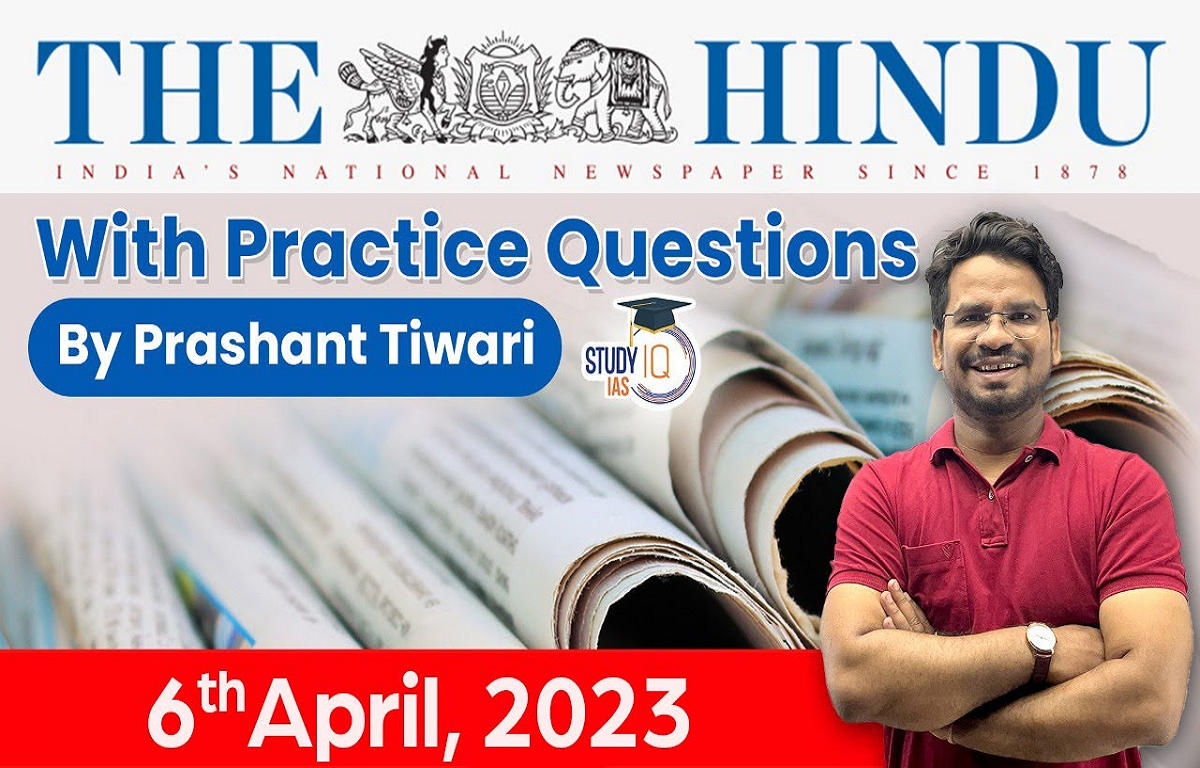The Hindu Newspaper Analysis for UPSC

The Hindu Newspaper Analysis 5 April 2023
- Situating India’s relations with its neighbours squarely within the framework of the country’s foundational values.
- South Asian region constituted an integrated civilisational area bound together by shared religions, languages, cultural traditions and blood ties and, in respect of the three largest countries — India, Pakistan and Bangladesh — shared historical memories as well.
- India had endured because of its enormous capacity to absorb, internalise, modify and transform, and yet retain its personality.
- India should develop its military power in order to shield itself from the turbulence around it and be ready to respond to the pressures of this age of coercive diplomacy.

- The World Water Conference that was convened by the United Nations (March 22-24 2023) was the first UN conference on freshwater in almost 50 years.
- The conference also marked a mid-term review of the Water Action Decade 2018-2028 (to advance the water agenda by energising existing programmes and projects, and inspiring water action to achieve the 2030 Agenda, in particular Sustainable Development Goal 6 (SDG 6), which envisages the sustainable management of water and sanitation for all.
- The central outcome of the conference was the international Water Action Agenda, to which governments, multilateral institutions, businesses, and non-governmental organisations submitted over 670 commitments to address water security issues.

- India’s commitments at the conference were: an investment of $240 billion in the water sector and efforts to restore groundwater level.
- A 2021 CAG report says that groundwater extraction in India increased from 58% to 63% between 2004-17.
- The 2023 Water Conference takes place within the context of SDG 6, and not within the context of the UN Water Convention 1997 and the United Nations Economic Commission for Europe (UNECE) Water Convention 1992, the two legally binding legal instruments on regulation of trans-boundary river water courses.

- According to the India Justice Report (IJR) 2022 (3rd edition), the State of Karnataka emerged at the top among the 18 large and mid-sized States with populations of over one crore.
- The Report (initiated by Tata Trusts in 2019) is a first-of-its-kind national periodic report that ranks the capacity of states to deliver justice.
- The Report is a collaborative effort undertaken in partnership with DAKSH, Vidhi Centre for Legal Policy, TISS-Prayas, etc.
- This report is based on overall data of 4 pillars of justice delivery namely Police, Judiciary, Prisons, and Legal Aid.
- The State of UP is at the lowest rank (18th) among mid-sized and large States (population > 1 crore), while the State of Goa is at the lowest rank (7th) among the small States with a (population < 1 crore).
- As on January 2, 2023, close to half the cases in Indian High Courts were pending for over five years. In the Allahabad (Uttar Pradesh) and Calcutta (West Bengal and A&N Islands) High Courts, over 63% of cases were pending for over five years.
- Whereas High Courts in northeastern India including Tripura, Sikkim and Meghalaya had less than 10% cases pending for over five years, according to the recently released India Justice Report 2022.
- The pendency of cases in courts is a demand and supply problem. The number of cases filed in courts is increasing each year while the number of judges presiding over those cases are either stagnant or not increasing in tandem with the rise in cases.

- The Centre is foreseeing a “stagnation” in milk production and a possible scarcity of ghee and butter as an impact of the lumpy skin disease (LSD) that took the lives of about 1.89 lakh cattle recently.


What are Padma Awards?
Padma Awards are one of the highest civilian honors of India announced annually on the eve of Republic Day after the Bharat Ratna.
- The Award seeks to recognize achievements in all fields of activities or disciplines where an element of public service is involved.
- The total number of awards to be given in a year (excluding posthumous awards and to NRI/foreigners/OCIs) should not be more than 120.
- The award does not amount to a title and cannot be used as a suffix or prefix to the awardees’ name.
- Categories: The Awards are given in three categories:
- Padma Vibhushan is awarded for ‘exceptional and distinguished service;
- Padma Bhushan is awarded for ‘distinguished service of a high order’; and
- Padma Shri is awarded for ‘distinguished service’.
- All nominations are placed before the Padma Awards Committee, which is constituted by the Prime Minister every year.
- The Committee is headed by the Cabinet Secretary and includes Home Secretary, Secretary to the President and four to six eminent persons as members. The recommendations of the committee are submitted to the Prime Minister and the President of India for approval.
- The Government of India instituted two civilian awards-Bharat Ratna & Padma Vibhushan in 1954.
- The Padma Vibhushan had three classes namely Pahela Varg, Dusra Varg and Tisra Varg. These were subsequently renamed as Padma Vibhushan, Padma Bhushan and Padma Shri in 1955.
- Dilip Mahalanabis (Padma Vibhushan): The 87-year-old paediatrician has been posthumously honoured for pioneering the wide use of Oral Rehydration Solution (ORS), a solution which has led to 93 percent reduction in deaths caused by diarrhoea, cholera and dehydration, especially among infants.





















 WhatsApp
WhatsApp